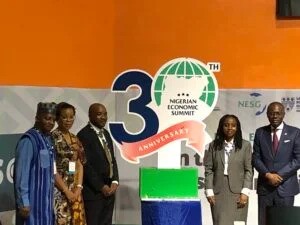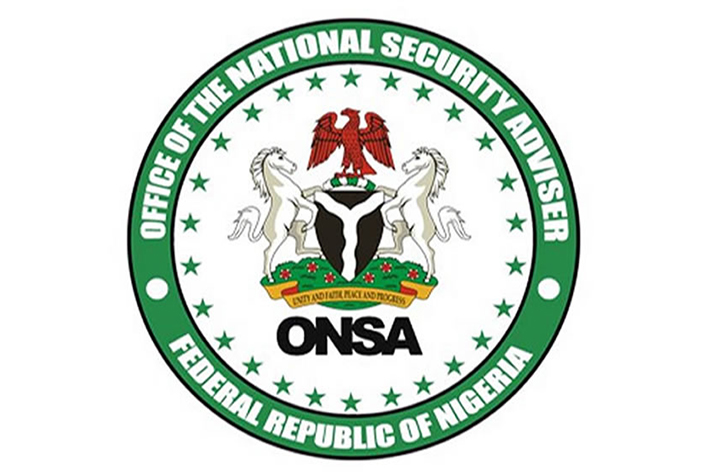News
PSC appoints DIG, promotes 1,897 senior officers
The Police Service Commission (PSC) has approved the appointment of Mr Dasuki Galadanci as Deputy Inspector-General of Police (DIG), and the promotion of 1,897 senior police officers.
The Head of Press and Public Relations of PSC, Mr Ikechukwu Ani, said this in a statement on Wednesday in Abuja.
He said the new DIG, appointed to represent the North West Geopolitical zone, was the Assistant Inspector-General of Police (AIG) incharge of Zone 12 Bauchi, before the appointment.
Ani said Galadanci would replace Mr Ibrahim Ka’oje, the DIG representing the zone, who will retire on Feb. 2.
He said the commission elevated 14 Commissioners of Police to the rank of AIG; 21 Deputy Commissioners of Police (DCP) to Commissioners, and 20 Assistant Commissioners (ACP) of Police to DCP.
According to him, one of the commissioners for promotion to AIG was, however, stepped down to enable the commission to review pending disciplinary matters against him.
He said the newly promoted AIGs are Yetunde Longe, Haruna Garba, Tajudeen Abass, Rex Dundun, Durosinmi Olatoye and Afolabi Adeniyi.
Others are Abiodun Asabi, Julius Okoro, George Chuku, Paul Omata, Yusuf Akeem, Bzigu Dali, Idris Nagoyo, and Ogundare Emmanuel.
The PSC spokesman also said 109 Chief Superintendents of Police (CSPs) were promoted to ACP while 184 Superintendents of Police were elevated to the rank of CSP.
He added that the commission also approved the promotion of 1,549 Assistant Superintendents of Police (ASP) to Deputy Superintendents of Police (DSP).
Ani said the approval had been conveyed to the Inspector-General of Police for implementation.
He said the Chairman of PSC, Dr Solomon Arase, who presided over the commission’s management meeting, urged the promoted officers to quickly settle down to their new ranks “and go forth and win the war against banditry, kidnapping and violent crimes in the country.”
He said the nation was facing an avoidable unprecedented wave of criminal assaults on all fronts and expressed the commission’s dissatisfaction over the trend of events.
Arase, therefore, enjoined the officers to crime-map their various areas of responsibility for quick and decisive intervention.
He said the officers must engage in predictive policing to mitigate the activities of criminal gangs marauding across the length and breadth of the country.
“As senior officers, you must be held responsible for any relapse in the security apparatus of the nation.
“You must see your new ranks as a call to greater dedication to the service of your fatherland,” the PSC chairman added.
News
Sanwo-Olu, NESG harp on PPP for economic growth


Gov. Babajide Sanwo-Olu of Lagos State has emphasised the role of public-private sector partnerships in driving accelerated sustainable economic growth in Nigeria.
He made the remark at the Nigerian Economic Summit Group (NESG) Public Lecture and Founders’ Forum held at the Lagos Business School on Thursday.
The event, which marked the official launch of the 30th anniversary of the Nigerian Economic Summit (NES) has the theme: “In the National Interest: Reflecting on the Past, Reimagining the Future.”
Sanwo-Olu said it was imperative that the public sector improved on its synergy with various actors pursuing a collective agenda of service for the citizens.
The governor highlighted the significant role the NESG plays in bringing together public and private sector leaders in the country in an ongoing dialogue to shape, influence and create a thriving competitive and successful economy.
“We’re not where we should be and we must continue to set goals to inspire ourselves to do better as a nation
“We may not always achieve our targets for our vision timelines, but that should not be an excuse for not trying,” he said.
He commended the NESG for its various interventions such as the flagship annual summit, roundtable and sectorial policy commissions, technical support work and policy innovation centre.
He, however, urged NESG to explore ways of deepening linkage between policy work and public consciousness that allows engagement with the citizenry.
Delivering the lecture, Mrs Ifueko Omoigui-Okauru, Managing Partner, Compliance Professionals PLC, said that while there had been significant economic changes, more needed to be done to ensure accelerated economic growth.
Omoigui-Okauru said that there was need to build inclusive policies that reflect the realities of the nation rather than imposing replicas of other countries.
“In 30 years, we may have made some progress, but we can’t say we have radically transformed Nigeria.
“As we reflect on the NESG, there’s still a lot to be done in bridging the rural-urban divide and have an inclusive agenda.
“We see our journey as work in progress. We need to determine the parameters that would drive our success and put policies in place to move us in the direction where we need to be.
“It is important for us to move away from self interest, think of ways to use technology and other frameworks to collectively achieve the Nigeria of our dreams,” she said.
Earlier in his opening remarks, Mr Niyi Yusuf, Chairman, NESG, said the 30th Summit reaffirmed the essentiality of public-private partnerships in tackling complex economic realities.
Yusuf, however, said that the journey to embracing market mechanisms has not been without its challenges.
He reiterated unwavering commitment in driving reforms through rigorous research, economic and social programmes, and inclusive summits, all aimed at shaping the socio-economic development of our nation.
“Thirty years ago, at a critical juncture in our nation’s history, the NES was born out of a necessity when the winds of economic challenges blew fiercely, necessitating a platform for robust public-private dialogue.
“Since our inaugural summit in 1993, the NES has been a progressive economic discourse rooted deeply in collaborative efforts between government leaders and private sector visionaries.
“Each Summit has crafted policies and strategies essential for removing barriers to competitiveness, growth, and inclusive development.
“Therefore, in commemorating this 30th anniversary, it is essential to assess and discuss the role of this public-private dialogue platform in Nigeria’s socio-economic landscape to provide us insights for future engagements,” he said.
The chairman assured collaborative efforts with the three arms of federal and subnational governments and private sector communities to propel Nigeria towards a more resilient, inclusive and prosperous future.
Dr Pascal Dozie, Chairman, NESG Advisory Board, listed political, economic, education and environment sectors as pathways to reimagining Nigeria’s future
Dozie, also pioneer Chairman of NESG Board of Directors, was represented by Mr Frank Aigbogun, Chief Executive Officer of BusinessDay.
He charged NESG to adopt new strategies in providing collaborative leadership in seeking answers to the following crucial questions.
“How do we strengthen democratic institutions and rule of law, foster culture of inclusiveness and representation?
“How do we promote transparency and accountability in governance and inculcate the culture of consequences for bad behaviour in every sphere of life?
“In economic reimagining, how do we diversify Nigeria’s economy, reduce dependence on oil, foster a business friendly environment and develop the much needed infrastructure base in a coordinated nationwide approach?
“How do we repurpose the educational system to focus on science, technology, engineering and mathematics, encourage technology entrepreneurship and innovation and address unemployment?
“For the environment, how can we develop sustainable agriculture and food security, promote sustainable practices, renewable energy and eco tourism?
“It is imperative that the NESG community leads from the front in not only providing actionable answers to these questions but also making sacrifices to ensure they are implemented,” he said.
Similarly, Chief Executive Officer of NESG, Dr Tayo Aduloju, said that strong institutions, political will, accountability by all stakeholders and the willingness for the government to allow private sector to drive growth were factors needed for a successful economic development.
“The challenge for us today is how to drive the country forward over the next 30 years in a way that is not just growth but growth that creates jobs and opportunities for everyone and no one is left behind.
“We are dealing with a country that is going through macro-economic volatility and instability.
“So, the lessons here at the forum are deep reflections of what should change in our approach, a stronger priority on execution, a deeper commitment on accountability of government systems to deliver and how economic barometers impact the ordinary man on the street.
“Our resilience to hold government accountable, to keep insisting that there must be an economy that works for all Nigerians, rule of law, an environment in which free enterprise is practiced, is what we must continue to fight for,” he added.
News
NCS FoU Zone ‘B’ Nabs Fake Customs Officer


News
ONSA directs full enforcement of Nigeria’s cybercrime law


The Office of the National Security Adviser (ONSA), has directed all law enforcement agencies, regulators, businesses and stakeholders to put in place mechanisms for the full enforcement of the Cybercrimes Prohibition Act.
This is to secure Nigeria’s Critical National Information Infrastructure (CNII), counter terrorism and violent extremism, strengthen national security and protect economic interests.
The Head-Strategic Communications, ONSA, Mr Zakari Mijinyawa, made this known in a statement on Thursday in Abuja.
He said that the directive was part of the concrete steps being taken to prevent the use of social media and other platforms by terrorists and organised criminal groups.
Mijinyawa said that Nigeria had in 2022, joined 66 other countries that signed and ratified the Budapest Convention on Cybercrime.
The convention was to enhance international cooperation, provide common platform and procedural tools for efficient and safe cyberspace.
This, he said is pursuant to section 41(2) (a) of the Cybercrime Act 2015 requiring conformity of Nigerian cybercrime and cybersecurity laws and policies with regional and international standards.
Mijinyawa said that African leaders had recently stressed the urgent need for improved deployment of greater support and resources towards strengthening cybersecurity activities in Africa.
He added that the measure was also in line with the agreement reached at the just concluded High Level African International Counter Terrorism Meeting in Abuja.
Mijinyawa said additional resources would be deployed to counter terrorism and violent extremism as provided in section 44(5) of the Cybercrimes Act.
-
capital market2 years ago
Rt.briscoe, FBNH, Others halts negative performance of stock market
-
Finance3 months ago
Court orders Sen. Victor Umeh to repay N136m bank debt to AMCON
-



 Abuja Update2 months ago
Abuja Update2 months agoUNDP, FG partnership needed to achieve inclusion, equity- Minister
-
Abuja Update1 month ago
Banks drive stock market performance with N147bn gain
-



 Business1 week ago
Business1 week agoTingo Group unveils Tingo Electric, Tingo Cola drink at Lagos launch
-



 Health2 weeks ago
Health2 weeks agoCapacity training will reduce migration of health workers- NPHCDA
-
News4 months ago
Oil thieves sponsoring malicious media campaign against Navy – Spokesman
-



 Infotech1 month ago
Infotech1 month agoWorld Backup Day: NITDA urges Nigerians to ensure backup of data






